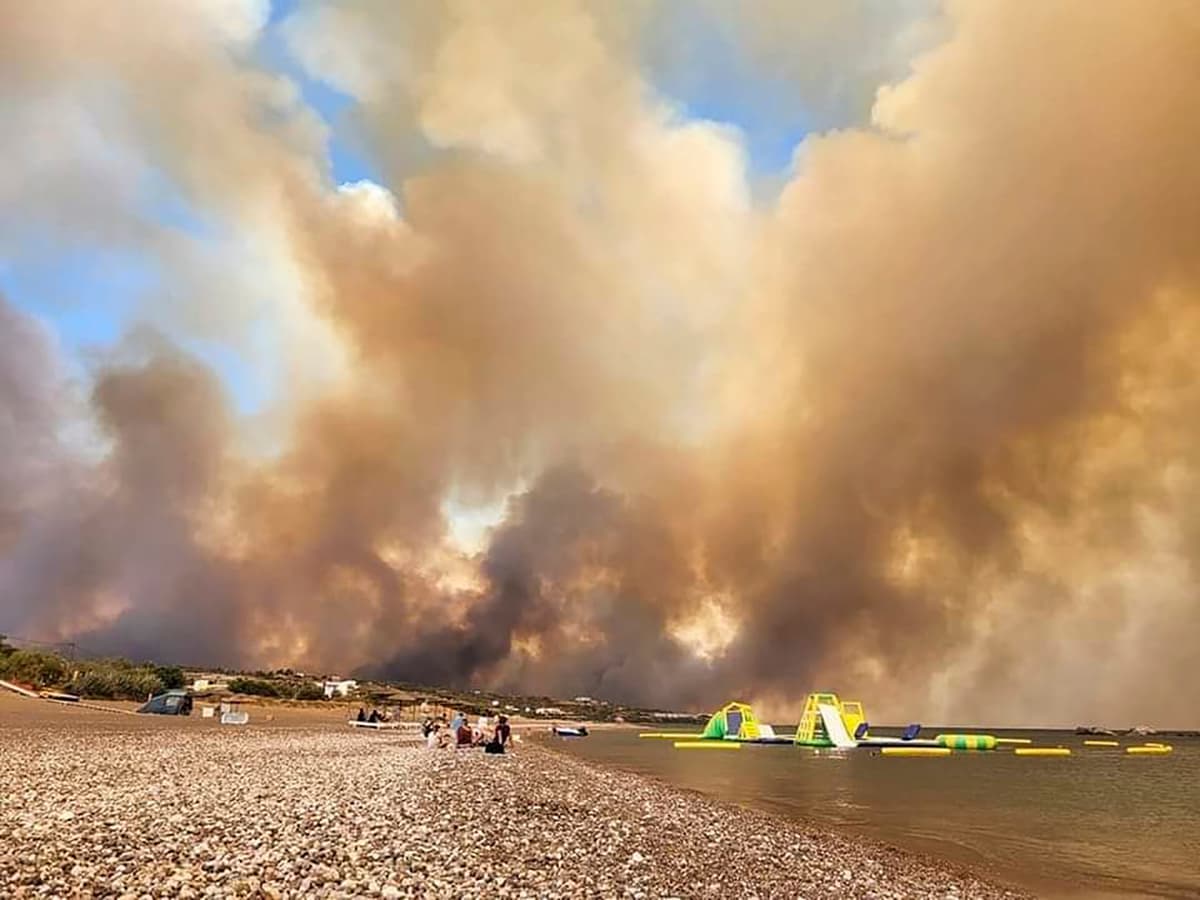It’s Holidays From Hell as Searing Heat in Europe Sends Travelers Packing
Tourists are evacuated by sea after a fire threatens hotels at Rhodes, while Italy, Spain, and Greece sizzle as mercury soars.

MEGARA, Greece — The seawater near this historic town on the Isthmus of Corinth is on fire. Not literally, but anyone hoping to find relief from the searing heat by jumping in the water will currently find temperatures flirting with the high 80s. Similar phenomena are being reported along vast stretches of the storied Mediterranean coasts of not only Greece but Cyprus, Italy, and Spain. It is, in effect, impossible to cool down.
That jarring reality was just experienced by this correspondent, who for lack of a functioning air conditioner jumped into Megara’s sea only to emerge a few minutes later dizzy, overheated, and dreaming of a long weekend in Iceland. Amid extreme weather warnings issued by Britain’s foreign office and states of emergency issued by authorities across southern Europe, some travelers are having to make adjustments to their plans or even cancel their trips due to the heat.
At the popular Mediterranean island of Rhodes, a wildfire has been raging for five days. By Saturday firefighters were still unable to control the blaze, leading to compulsory evacuations from seaside hotels imperiled by the flames. The newspaper Protothema reported that 1,000 people were rescued thanks to a trio of Coast Guard vessels and 20 private ships off the shore of the villages of Kiotari and Lardo. A navy torpedo boat and two commando boats were also reportedly on the scene.
The Greek press is reporting that at Rhodes’ Ypseni Monastery, firefighters managed to convince nuns who had refused to abandon the premises to leave in order to avoid a potential human catastrophe. Prime Minister Mitsotakis was tracking the events minute by minute at Greece’s National Coordination Center for Operations and Crisis Management.
Dramatic video footage of the flames licking the island’s south coast made a normally picturesque seaside resort area resemble something closer to a holiday hellscape.
There are also multiple reports of sun-baked tourists simply packing it in. According London’s Evening Standard, a British traveler had to jettison her vacation to the Greek island of Rhodes, valued at more than $3,000, after the hotel she and her family were staying at turned into a “giant oven.”
In some cases there are simply minor inconveniences. At Athens, the Acropolis is normally packed with tourists all day long but in recent days the entire site has been closed for several hours in the afternoons due to heat that turned out to be unremitting. The closures are set to continue as forecasters say the worst of the heat is yet to come
It isn’t just the Acropolis. As weekend temperatures approached 110 fahrenheit at Athens, the observation deck at Mount Lycabettus was also off-limits to tourists. South of the capital, on the island of Crete, extreme heat meant hikers were not allowed to enter the popular Samaria Gorge.
Tourists visiting Rome during the current round of heatwaves have to decide if the heat is making traditional sightseeing at outdoor places like the Colosseum too difficult to bear. For some it clearly is: some hospitals in the Italian capital this week were reporting a 25 percent jump in emergency admissions for dehydration and heat-related illnesses.
When will the stagnant curtain of heat hanging over Europe — and elsewhere — finally end? A headline from the BBC, “Climate records tumble, leaving Earth in uncharted territory,” is not exactly encouraging. America has not spared, of course, with cities like Phoenix and Palm Springs already roasting in triple-digit temperatures for weeks on end. Not a good time to be outside, or even on an airplane.
In a statement, the director of Greece’s National Meteorological Service, Antonis Lalos, said the country was facing a prolonged heat wave “worse than that of 1987” as temperatures were expected to reach 113 F in places over the weekend.
The country’s General Secretariat of Civil Protection has issued an alert for extreme fire risk on Sunday for the capital region, Attica, and a dozen other regions around Greece.
City streets remained uncharacteristically quiet as residents sought shelter indoors from the heat, although the ports of many Greek holiday islands like Hydra and Serifos were still bustling with tourists.
Meanwhile, a fire that had been raging in recent days near Megara had been brought under control. Temperatures were forecast to dip slightly on Monday before rising again into triple-digit territory by Tuesday.

